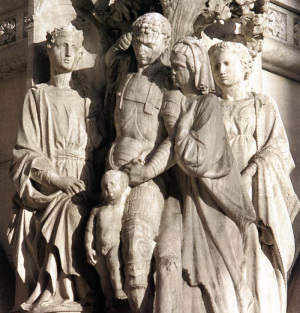Solomon highly likely penned chapters 1 to 29 of Proverbs. A man named Agur wrote chapter thirty. King Lemuel wrote chapter thirty-one. The author tell us right in the first chapter the nine sets of reasons why the book was written.
Solomon wrote Proverbs to offer instruction, wisdom and understanding (Proverbs 1:2). He also recorded the book to help others gain an understanding of judgment and equity (verse 3), to acquire simple prudence and to offer discretion and knowledge to the young (verse 4).
The king additionally states, in verses 5 and 6 of Proverbs 1, he recorded his words to increase the wisdom of somebody already wise, to offer advice on wise counsel, and to give understanding regarding the enigmas and riddles given by those who have attained wisdom.
Although Proverbs was written with Solomon's descendants in mind, as well as the young men of Israel, it is a wise read for anyone!

What does it teach about wisdom?
Wisdom calls aloud outside; She raises her voice in the open squares . . . (Proverbs 1:20).
Wisdom, no matter where people are, cries to be heard and followed. Understand a basic fear of God is available to all men. Through God's Holy Spirit, wisdom can empower the believer to make good, righteous choices - choices that led to a full and rich life.
How did Solomon become as wise as he did? He asked for it! And God gave him not only wisdom but riches and honor as well.
Most important topics in Proverbs
The most important themes in this book of knowledge are wisdom, understanding, the commandments (laws) of God and the breaking of God's laws (also known as sin and iniquity). Lastly, the book has many sayings contrasting God's versus Man's way of life.
What if you want wisdom?
Proverbs 2 tell us what to do if we want wisdom. If we want to be wise we must accept the Bible, the word of God, and learn His commands (verse 1). We must learn to have an "ear" for understanding and set our hearts to receive it (verse 2). We also must be willing to call and cry out for wisdom (verse 3) and pursue it like a great treasure (verse 4).
What happens to those without wisdom?
A person with no wisdom brings to himself many consequences, including foolishly pursuing the ways of evil. Those who run after rebellion against God have perverse words (see James 3:8, Romans 3:11 - 14). Their ways are dark and they love darkness (symbolic of evil) (Prov. 2:13, Psalms 91:6, John 1:19) and they enjoy running after and the spoils of doing evil (Prov. 2:14, Luke 8:14, 2Timothy 3:1 - 7).
Those who reject God are rebellious and refuse to do what is right (Prov. 2:15, Matthew 7:13 - 14, Philippians 2:15). They behave in devious ways and are deceptive (Prov. 2:15, Ephesians 4:14, Matthew 24:24). The additionally disregard covenants (agreements) (Prov. 2:17, Romans 1:22 - 32).
The Ten Commandments and Proverbs
King David, Solomon's father, said that God's commandments made him far wiser than his enemies (Psalm 119:98-100, 104). God's laws play a critical part in instructing us regarding righteous behavior. Passages in Proverbs that refer to God's commandments or laws include Prov. 2:1 - 2, 22, 3:1 - 2, 4:4, 6:20 - 23, 7:1 - 3, 8:32, 13:13 - 14, 16:17, 19:16, 23:26, 28:4, 7, 9, 29:18, 31:5.
The thirteen things God hates!
God states, in no uncertain terms, the things he especially dislikes.
1) A look that is proud (Proverbs 6:17).
2) A tongue that is full of lies (6:17).
3) People who kill those who are innocent (6:17).
4) People who set their heart to devise evil (6:18).
5) Those who indulge in mischief (6:18).
6) False witnesses (6:19).
7) Someone who seeks to split up relationships (6:19).
8) Someone who lies (12:22).
9) Sacrifices offered by those who are evil (15:8).
10) The ways of evil (15:9).
11) Someone who protects those who do evil (17:15).
12) Those who condemn the guiltless (17:15).
13) Those who cheat people through false weights (20:10).
This overview on who wrote Proverbs will make it a bit easier for those new to the Bible to understand this fascinating book.